The personal blog of Jay Garmon: professional geek, Web entrepreneur, and occasional science fiction writer.
Showing posts with label nerd words. Show all posts
Showing posts with label nerd words. Show all posts
Wednesday, August 25, 2010
Nerd Word going on hiatus
Due to a surfeit of commitments -- and the fact that it's starting to feel like a me-too feature nobody really needs -- the Nerd Word of the Week is going on indefinite hiatus. In fact, the entire content makeup of JayGarmon.net may be in for an overhaul here as soon as I clear some daylight in my schedule. Stay tuned for details.
Thursday, August 19, 2010
Nerd Word of the Week: Schminternet
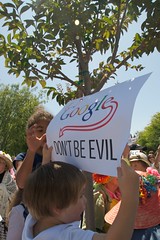 Image by Steve Rhodes via FlickrSchminternet (n.) - A version of the Internet that does not operate under net neutrality standards and thus has tiered access and "surfing tolls" for certain content, services, or websites. The phrase is named after Google CEO Eric Schmidt who notably reversed course on net neutrality when Google forged a traffic prioritization pact with Verizon. The term was coined by Jeff Jarvis who snarked on Twitter: "The Schminternet = not the internet. Comes with new fees."
Image by Steve Rhodes via FlickrSchminternet (n.) - A version of the Internet that does not operate under net neutrality standards and thus has tiered access and "surfing tolls" for certain content, services, or websites. The phrase is named after Google CEO Eric Schmidt who notably reversed course on net neutrality when Google forged a traffic prioritization pact with Verizon. The term was coined by Jeff Jarvis who snarked on Twitter: "The Schminternet = not the internet. Comes with new fees."I bring it up because: The Google-Verizon wireless traffic pact just won't die. Wired referred to Google as a "net neutrality surrender monkey" (earning extra points for the Simpsons reference) and Jon Stewart took shots at Google from his perch atop The Daily Show. While some predicted Google would sell out years ago, it is nonetheless disillusioning that the company once seen as the champion of the open internet is now playing the same self-serving corporate games it formerly opposed. If things keep in this direction, the backlash is only going to get stronger and calling Google's tiered internet the Schminternet is the nicest thing web activists will say about Eric Schmidt or his company.
Related articles by Zemanta
- Internet, schminternet (buzzmachine.com)
- Wireless Is Not Different. You Can't Be Half-Open (techcrunch.com)
- 10 Media Takes on the Google-Verizon Net Neutrality Proposal (wired.com)
- Where Facebook Stands on the Net Neutrality Debate (webpronews.com)
Thursday, August 12, 2010
Nerd Word of the Week: HOPA girl
 |
| Image mercilessly stolen from theChive. |
I bring it up because: HOPA girl went down this week, and in so doing sparked a navel-gazing debate amongst the blogosphere about the nature of memes and the gullibility of traffic-starved bloggers. Basically, once one major site runs with a HOPA girl meme -- which by definition seems too good to be true and thus likely to be a hoax -- every other major meme site has to run with it too. All it takes is one high-profile sucker and the whole Internet is obligated to play along for fear of losing immediate traffic. Thus, expect to see more HOPA girls, not less --especially since the guys behind HOPA girl have done this before. So much for the web being the future of (serious) journalism.
Related articles by Zemanta
- Elyse Porterfield: HOPA Dry Erase Girl A Hoax, Identity Revealed (manolith.com)
- It's Official: The Best Bosses Read TechCrunch! (techcrunch.com)
- Shocker: Viral HOPA girl totally a hoax! (inquisitr.com)
- "Jenny" the HOPA, Job Quitting Girl a Hoax. Duh. (cbsnews.com)
Thursday, August 05, 2010
Nerd Word of the Week: Plutoed
 Image by Dallas1200am via Flickr
Image by Dallas1200am via FlickrI bring it up because: As Greg Van Eekhout noted -- and possibly coined this week's nerd word in so doing -- they just totally Plutoed torosaurus. While the dinosaur species triceratops and torosaurus were originally thought to be separate, recent evidence shows that a triceratops is really just a juvenile torosaurus. Thus, one species had to be Plutoed, and since triceratops has more name recognition, torosaurus is now a deprecated species. Frankly, I wish this logic had been around when brontosaurus was Plutoed, because apatosaurus just isn't as cool.
Related articles by Zemanta
- Triceratops may not have existed (sfgate.com)
- The Triceratops Never Existed, It Was Actually a Young Version Of Another Dinosaur [Dinosaur] (gizmodo.com)
- Poor Pluto... (graphjam.com)
- Brontosaurus, RIP (kottke.org)
- Picking Planets from Potatoes (physorg.com)
Thursday, July 29, 2010
Nerd Word of the Week: Jailbreaking
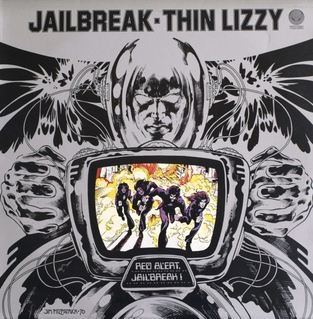 Image via Wikipedia
Image via WikipediaI bring it up because: A federal judge ruled this week that jailbreaking is legal. Specifically, circumventing DRM is legal, so long as that circumvention doesn't then lead to actual illegal activity. Thus, you can break the DRM on your DVDs in order to make backup copies of your movies or convert them to run on incompatible devices you legally own. You can't break the DRM and then use your newfound powers to produce and sell discount copies of your film collection. This ruling now makes it legal to jailbreak devices so long as you don't then use those devices for illegal purposes. Apple, as you might expect, wasn't happy about the ruling and reminds you that jailbreaking still voids your iPhone warranty. Techcrunch thus asks if we're about to see jailbreaking go mainstream, but then answers its own question -- by way of a Harvard Law professor -- that while jailbreaking is now legal, providing jailbreaking software may not be. There's been no firm ruling on what happens to jailbreak developers, but you can bet that's who Apple and friends go after next.
Related articles by Zemanta
- Jailbreaking Your iPhone Is Now Legal (John Brownlee/Cult of Mac) (techmeme.com)
- Zittrain: No Get Out Of Jail Free Card For Jailbreak Developers (techcrunch.com)
- Apple's Official Response To DMCA Jailbreak Exemption: It Voids Your Warranty (Leander Kahney/Cult of Mac) (techmeme.com)
- Why Jailbreaking Won't Shoot Up, Albeit, Being Declared 'Legal' in U.S. (techpluto.com)
- What the iPhone jailbreaking ruling means (FAQ) (news.cnet.com)
- The Pros and Cons of iPhone Jailbreaking (cbsnews.com)
Thursday, July 22, 2010
Nerd Word of the Week: High ground maneuver
 Image via Wikipedia
Image via WikipediaI bring it up because: Adams outed his high ground maneuver phrase just this week in his analysis of the Apple iPhone 4 "antennagate" press conference. Steve Jobs basically staked out the high ground of trying to fight dropped calls -- a problem every smartphone has -- and admitted that Apple failed to topple this unbeatable enemy. While Apple isn't getting a total free pass, the debate has moved on to how every smartphone deals with signal drops, rather than exclusively about how Apple's iPhone 4 exhibits the problem. That, my friend, is a classic high ground maneuver.
Related articles by Zemanta
- Steve Jobs: Phones Suck (outsidethebeltway.com)
- Apple, iPhone 4, and the Antenna: What's Next? (mashable.com)
- Apple iPhone 4 free cases will cost about $175 million (intomobile.com)
- Apple's iPhone 4 Problems Are A Blessing In Disguise (forbes.com)
Thursday, July 15, 2010
Nerd Word of the Week: Bacn
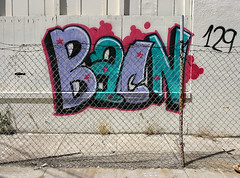 Image by funkandjazz via Flickr
Image by funkandjazz via FlickrI bring it up because: Google hates bacn, and it's suggested that's why Google can't build a successful social network. Google is all about the practical, useful, and minimal, while Facebook is a bacn-coated timesink. Google can't beat Facebook because Google is so spam-averse it won't even touch bacn.
UPDATE: Clearly I was wrong, as Google+ is a total bacn-factory.
Related articles by Zemanta
- Please Don't Send Bacn On Facebook! (acanmedia.com)
- From 10000 to 0 Emails in an Inbox in 24 Hours (problogger.net)
- Remember When We Were All Supposed To Quit Facebook? (techcrunch.com)
- Do you suffer from nerd rage? Take our quiz and find out! [Quiz] (io9.com)

Thursday, July 08, 2010
Nerd Word of the Week: Pseudonymity
 Image via Wikipedia
Image via WikipediaI bring it up because: Blizzard just launched RealID over at Battlenet, which ends pseudonymity for anyone participating in the ragingly popular World of Warcraft forums there. This has sparked a privacy debate, as RealID exposes your real name on all your Battlenet postings, and some folks don't want the world knowing how much time they spend in WoW forums, much less what gets said there. Everyone from CTRL+ALT+DEL and Penny Arcade to the Geek Feminism Blog and The Washington Post have weighed in. Many are claiming this is a loss of anonymity, but in truth Blizzard is eliminating pseudonymity, as your posts we're always tied to a consistent username. The move was made to ostensibly cut down on trolling -- in line with Gabriel's Greater Internet Dickwad Theory -- but Seriously Not Okay refutes that logic thusly:
It is a common misconception that trolling is caused by anonymity. It is not. It is caused by people being assholes.Some people simply enjoy being griefers, and don't care if they do it under a real name or a fake one. Eliminating pseudonymity or anonymity doesn't eliminate the asshole factor. That's worth remembering as more sites make sweeping changes like as Blizzard just did.
Related articles by Zemanta
- Is Pseudonymous Blogging Pure High School? (riehlworldview.com)
- Battle.net forum posts to require user's real names (vg247.com)
- An interesting experiment in online social forums (scienceblogs.com)
- Hacker News and pseudonymity (geekfeminism.org)
- You: World of Warcraft users blast Blizzard's 'Real ID' rule (washingtonpost.com)

Thursday, July 01, 2010
Nerd Word of the Week: Unicorn Pegasus Kitten
Unicorn Pegasus Kitten (n.) - A mythical beast modeled after the chimera that combines the rear legs and wings of a pegasus, the forelegs and head of a giant kitten and the horn of a unicorn. Seriously.
The unicorn pegasus kitten, sometimes referred to as the UPK, was created as a parody of conflated internet memes by artist Jeff Zugale at the request of author-blogger John Scalzi (depicted as an orc in the original UPK painting) and actor-author-blogger Wil Wheaton (depicted as a clown-sweatered orc-hunter in the original UPK painting) as part of a fundraising project to benefit the Lupus Alliance of America. The unicorn pegasus kitten instantly became a meme unto itself, with sci-fi songwriter John Anealio already providing its immortal ballad.
I bring it up because: As of today, the co-inspirator of the unicorn pegasus kitten is President of the Science Fiction and Fantasy Writers of America. Already his campaign platform has given way to a reign of terror. And unlike in the painting, there is no clown-sweatered spear-toting meme-rider to save us. Hooray!

The unicorn pegasus kitten, sometimes referred to as the UPK, was created as a parody of conflated internet memes by artist Jeff Zugale at the request of author-blogger John Scalzi (depicted as an orc in the original UPK painting) and actor-author-blogger Wil Wheaton (depicted as a clown-sweatered orc-hunter in the original UPK painting) as part of a fundraising project to benefit the Lupus Alliance of America. The unicorn pegasus kitten instantly became a meme unto itself, with sci-fi songwriter John Anealio already providing its immortal ballad.
I bring it up because: As of today, the co-inspirator of the unicorn pegasus kitten is President of the Science Fiction and Fantasy Writers of America. Already his campaign platform has given way to a reign of terror. And unlike in the painting, there is no clown-sweatered spear-toting meme-rider to save us. Hooray!
Related articles by Zemanta
- unicorn pegasus kitten. scalzorc. clown sweater. fanfic. AWESOME. (wilwheaton.typepad.com)
- Here's the Picture, You Supply the Thousand Words (wired.com)
- Revealing the Unicorn Pegasus Kitten + Sunday/Monday Recap (whatever.scalzi.com)

Thursday, June 24, 2010
Nerd Word of the Week: Day-and-Date
 Image via Wikipedia
Image via WikipediaI bring it up because: Day-and-date isn't just a film issue anymore, as both Marvel and DC comics have announced digital comic book strategies -- the latter just yesterday -- that include day-and-date releases for certain titles. This has comic retailers in a tizzy, which is why Marvel has priced their digital comics as more expensive than traditional comics, and why DC is diverting some of its digital profits to directly support retailers. The traditional book industry is also struggling with the day-and-date issue as applies to ebooks versus physical books, with fans staging Amazon one-star rating protests for books that don't offer day-and-date ebook versions. Meanwhile, Hollywood has found new ways to create day-and-date release conflicts, with some studios forcing Redbox to delay renting movies by 28 days to prop up DVD sales. Meahwhile, Paramount earned kudos for dropping the 28-day Redbox release window. Some see day-and-date releases as the future of all media. How fast we get there remains to be seen.
Related articles by Zemanta
- Paramount: Redbox Had 'Minimal Impact' on DVD Sales (newteevee.com)
- Wait, A Hollywood Exec Actually Making Sense With Regard To Movie Rentals And The Web? (techcrunch.com)
- DC Comics Brings Batman and Pals to iPad, PSP (wired.com)
- Marvel Pricing Digital Comics Three Times Higher Than Paper Copies (techdirt.com)
- Something Wicked This Way Comes (pvponline.com)

Thursday, June 17, 2010
Nerd Word of the Week: Motion gaming
 Image by Dekuwa via Flickr
Image by Dekuwa via FlickrI bring it up because: The power gamers just joined the motion gaming revolution this week at E3 2010, with Microsoft unveiling Kinect for the Xbox 360 (formerly known as Project: Natal) and Sony debuting the Playstation Move for the PS3. Both employ some version of the motion gaming paradigm pioneered by the Wii -- though Kinect does so without a physical controller -- bringing us one inching step closer to the eternal dream of a personal immersion holodeck. Call me when the augmented reality gamer glasses get here.
Related articles by Zemanta
- Sony touts 3-D and motion-control gaming for PlayStation 3 at Entertainment Electronic Expo (taragana.com)
- Between the Kinect & X360 Slim, Maybe Microsoft Should Rename the Products XEROX 360 ... (geardiary.com)
- The Playstation Move vs the Xbox Kinect, may the best motion controller win (crunchgear.com)
- 'Kinect' first take: What it's like to play games without a controller (techflash.com)
- The Playstation Move is a Wii clone - but it's awesome (crunchgear.com)

Thursday, May 27, 2010
Nerd Word of the Week: Spoiler alert
 Image via Wikipedia
Image via Wikipedia I bring it up because: The long-running plot-complex TV show Lost aired its finale last Sunday, and the web has been overridden with dissections of the series resolution. For those of us that have never seen Lost but may wish to view it on DVD or Hulu someday, the appropriate use of spoiler alerts is much appreciated, as was the case with reimagined Battlestar Galactica, The Shield, The Wire, and Sopranos finales before it. Basically, any cult-favorite show that has ended since the advent of Twitter in 2006 has been subject to a delicate balance of fan commiseration and judicious spoiler-alerting, as divulging too much via a social networking post can earn you ire and scorn from the masses, and divulging too little will miss the point. Such is the online geek paradox.
Related articles by Zemanta
- Lost Finale: What the Web Wasn't Made For (mashable.com)
- "Lost" Fans Build Defenses Against Online Spoilers (patspapers.com)
- 'Lost' Series Finale Review & Spoilers Discussion (screenrant.com)
- Lost: Order The Complete Series (DVD & Blu-Ray) (musicbyday.com)
- 3 alternate endings to Lost [Lost] (io9.com)
- The spoiler-police: spoiling it for the rest of us? (futurismic.com)

Thursday, May 20, 2010
Nerd Word of the Week: Silver Age
I bring it up because: Today would have been Gardner Fox's 89th birthday. Fox, along with legendary editor Julius Schwartz, almost singlehandedly invented the Silver Age with science-fictional revamps of The Flash, Hawkman, Green Lantern and The Atom. Fox in particular was notorious for sprinkling interesting factoids into his comic works, especially from forensic scientist Barry "Flash" Allen, who often introduced these trivial tidbits as "Flash Facts." Moreover, DC Comics has recently gone to great trouble reinstalling the Silver Age versions of many characters -- including the Fox-created Hawkman, Atom, and Flash -- to some less than enthusiastic response. While the campiness hasn't reemerged, the return of these fondly remembered but often outgrown Silver Age icons is viewed by many (myself included) as a move backwards.
Related articles by Zemanta
- Forgotten Drugs of the Silver Age: Reverso (politedissent.com)
- DC/Marvel Character Tourney Silver Age Region, Round 2 Winners! (goodcomics.comicbookresources.com)
- Life In Ivy Town (alertnerd.com)
- Nerd Word of the Week: Mythology gag (jaygarmon.net)
- Nerd Word of the Week: Multiverse (jaygarmon.net)

Thursday, May 13, 2010
Nerd Word of the Week: Genericide
 Image via Wikipedia
Image via WikipediaI bring it up because: Velcro was trademarked 52 years ago today, and its still (barely) holding the line against genericide, forcing imitators to refer to themselves as "hook and loop fasteners." We'll see if Google has the same luck.
Related articles by Zemanta
- Google Denied "Nexus One" Trademark (techcrunch.com)
- Google triumphs in US trademark, German copyright cases (arstechnica.com)
- Google moves to block Groggle over 'similar trademark' (telegraph.co.uk)
- Google Trademarks The Word "We" - Well, Kind Of (seroundtable.com)

Thursday, May 06, 2010
Nerd Word of the Week: Ecopocalypse
 Image by slworking2 via Flickr
Image by slworking2 via FlickrI bring it up because: The term ecopocalypse tends to bubble up whenever a major environmental disaster, like the Deepwater Horizon oil spill, makes headlines. If you're a bookseller, now would be a great time to stock up on some apocalyptic fic with an environmental (or, at least, post-peak oil) bent, such as Paolo Bacigalupi's The Windup Girl, Margaret Atwood's Oryx & Crake or The Handmaid's Tale, The Rift by Walter Jon Williams, or S.M. Stirling's Dies the Fire.
Related articles by Zemanta
- Margaret Atwood and the end of humanity (cnn.com)
- BP vows to clean up US oil slick (news.bbc.co.uk)
- Bob Franken: Slippery Oil Slicks (huffingtonpost.com)
- Rush Limbaugh on the BP Oil Spill: "It's as natural as the ocean water is." (treehugger.com)

Thursday, April 29, 2010
Nerd Word of the Week: Openwashing
 Image by trawin via FlickrOpenwashing (n.) - Portraying a product or technology as open when in fact it's closed and proprietary. Yet another play on the notion of whitewashing, applied to open source and open standards of technology.
Image by trawin via FlickrOpenwashing (n.) - Portraying a product or technology as open when in fact it's closed and proprietary. Yet another play on the notion of whitewashing, applied to open source and open standards of technology.I bring it up because: Facebook is trying to brazenly openwash itself again, this time with the Open Graph Protocol. The OGP is open in the sense that you're free to share data with Facebook, and Facebook might share data with its partners, but all the data belongs to Facebook and only businesses that play by Facebook's rules can get at it. That's not an open protocol; that's a cartel. The OGP is also open in the sense that your Facebook friends can now share data about you unless you explicitly forbid it, which takes some doing. Doc Searls reminds us that we've seen this kind of openwashing before -- Microsoft called it Hailstorm/Passport -- and it didn't work. Sun Microsystems was also a victim of its own openwashing. Maybe the same will be true this time, but I wouldn't bet on it. Regardless, just because you call yourself open doesn't make it so. Beware of CEOs bearing (open) gifts.
Related articles by Zemanta
- Facebook to replace hyperlinks with social links (v3.co.uk)
- Facebook's Open Graph: It Depends On What The Meaning Of The Word "Open" Is (techcrunch.com)
- Open vs. Closed: What Does Open Really Mean? (gigaom.com)
- Understanding the Open Graph Protocol (factoryjoe.com)
- Google Engineers Abandon Facebook (arnoldit.com)

Thursday, April 22, 2010
Nerd Word of the Week: Expanded universe
 Image via Wikipedia
Image via WikipediaI bring it up because: LucasFilm has confirmed at least two more mainstream Star Wars expanded universe projects, a Star Wars sitcom from Seth Green and the Robot Chicken guys, and an animated series chronicling the post-Jedi adventures of Han, Luke and Leia. This doesn't even touch on the news that Joss Whedon may be writing and directing the Avengers movie, which plays off the highly successful Iron Man movie continuity, including Iron Man 2 which opens May 7. It's fair to say that a great many more people saw Iron Man the movie than have ever read an Iron Man comic, and Marvel's plans for a cohesive movie continuity between Iron Man, the Incredible Hulk, Thor, Captain America and The Avengers will pull equally one-sided numbers. This begs the question, which is the expanded universe: The Marvel movies, or the Marvel comics?
Related articles by Zemanta

Thursday, April 15, 2010
Nerd Word of the Week: Conlang
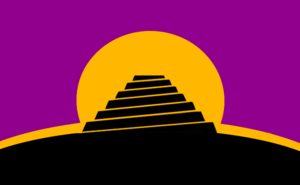 Conlang flag - Image via Wikipedia
Conlang flag - Image via WikipediaI bring it up because: HBO has commissioned a conlang of the Dothraki language for its miniseries adaptation of George R. R. Martin's Song of Ice and Fire book series. Just chalk it up as yet another concession to the too-passionate-to-be ignored geek demographic.
Related articles by Zemanta
- Forget About Fantasy In HBO's Games Of Thrones TV Show [Genre Embarrassment] (io9.com)
- Tweet in Klingon - Star Trek fans, tweet your Klingon phrases! (twi5.com)
- Parlez-vous Na'Vi? (telegraph.co.uk)

Thursday, April 08, 2010
Nerd Word of the Week: Con
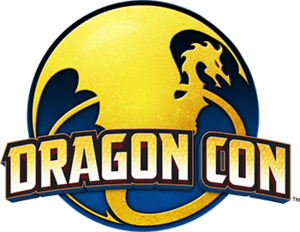 Image via Wikipedia
Image via WikipediaI bring it up because: This weekend my local sci-fi con, ConGlomeration, gets underway -- and I've never been above a shameless plug. If you need a better reason, the 2010 Hugo nominations came out this week, which means WorldCon membership -- which you need to vote on the awards -- is top of mind in the nerd-o-sphere.
Related articles by Zemanta
- Predicting the Next Hugo Award-Winning Novel (workbench.cadenhead.org)
- Hugo Thoughts, 2010 (whatever.scalzi.com)
- A Fantasy Convention Virgin Reports from MegaCon 2010 (trueslant.com)
Thursday, March 25, 2010
Nerd Word of the Week: Mythology gag
I bring it up because: Apparently mythology gags are now so pervasive and expected that fans feel entitled to get upset about how they are presented. Case in point, fanboys getting bent out of shape that Angela Bassett is playing Amanda Waller in the Green Lantern movie. Waller, nicknamed "The Wall," is portrayed in comics as having roughly the same build as a starting NFL nose guard. Thus, having the slim and trim Bassett portray her is viewed by some diehards as a kind of fan betrayal. The outrage, by the by, has nothing to do with Hollywood once again skinnying up a curvy character for the mainstream; the fanboys are raging because Bassett as Waller is inaccurate. Nevermind that Waller is tangential as best to the Green Lantern mythos -- she has had almost no major encounters with the Green Lantern characters in comic book continuity -- and that including her in the movie at all is simply a gift to knowing comic book fans. There was a time when simply having any version of Waller in a Green Lantern film would have been a grin-inducing gift to comic readers. Today, we not only expect six dozen mythology gags in the trailer alone, but we want them on our terms. Oh, how fanboy entitlement hath grown.
Related articles by Zemanta
- Angela Bassett Joins 'Green Lantern' (cinematical.com)
- No 'Pink Bodysuit' For Blake Lively In 'Green Lantern,' Two More Actors Added To Film's Cast (splashpage.mtv.com)
- Greg Berlanti Talks Green Lantern & The Flash (screenrant.com)

Subscribe to:
Posts (Atom)






![Reblog this post [with Zemanta]](http://img.zemanta.com/reblog_e.png?x-id=aa3cb649-5194-47e6-aacf-ea0d50945daa)